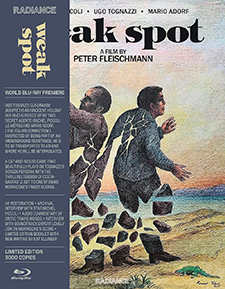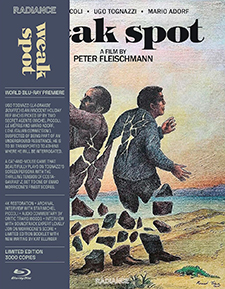Weak Spot (Blu-ray Review)

Director
Peter FleischmannRelease Date(s)
1975 (January 28, 2025)Studio(s)
Gaumont Distribution (Radiance Films)- Film/Program Grade: A
- Video Grade: A
- Audio Grade: A
- Extras Grade: A-
Review
An intriguing, unpredictable and realistically violent thriller with political overtones, Weak Spot (La faille, 1975), is a French-Italian-West German co-production that was co-produced by one of its stars, the much-missed Michel Piccoli who delivers another great performance here. The film is based on a novel by Greek writer Antonis Samarakis, and like Costa-Gavras’s Z (1969), takes place in an unnamed Mediterranean country; the locations are clearly Greece (the Parthenon is even visible in one shot) and all the signage is in Greek, but the spoken language is entirely French. Greek politics, specifically the military junta ruling the country until 1973 are referenced, yet throughout the film are political posters seemingly created for the film implying a fictitious state.
This is one of those films best experienced cold, with no expectations or knowledge of its plot going in, so this review by design will reveal as little as possible. Travel agent Georgis (Ugo Tognazzi) is enjoying a drink in a sports bar when a man steps on his foot; he’s annoyed but thinks nothing further of this until he’s arrested minutes later, strip-searched and interrogated by a quietly menacing police superintendent (Dimos Starenios, very effective). He implies the man who brushed against Georgis is an enemy of the state and that Georgis is his accomplice. Georgis’s innocent doodling of his girlfriend’s ample breasts on a napkin are misinterpreted into a sinister code. Adriana Asti, wife of director Bernardo Bertolucci, plays the girlfriend in an early scene that at first seems superfluous but really isn’t.
Georgis, naturally, denies any connection to the man, but police superintendent is unconvinced, assigning “the Investigator” (Piccoli) and “the Manager” (Mario Adorf) to transport the prisoner to a central holding area, presumably to be tortured and perhaps “disappeared.” Georgis accompanies the two men without handcuffs, and both detectives are friendly toward their suspect, if guarded. They begin a long drive to catch a ferry to “Central,” have car trouble along the way, and stop at a small coastal fishing village to kill time while the car is being repaired—maybe. In this holiday haven choking with beautiful women in bikinis and plenty of picturesque cafés (growingly popular with tourists, we’re told) exists an underlining tension comparable to Occupied France during World War II. What’s going on here?
Apparently, the idea of this good cop/good cop arrangement is to ease Georgis into a confession or trick him into attempting an escape, but Georgis quickly sees through the ruse, though appearances can be deceiving. The Investigator, well-dressed, sensitive and low-key, refers to marital problems while the Manager is coarse, slovenly, and a terrible driver. Georgis first appears to be a classical Wrong Man in the Henry Fonda/Alfred Hitchcock tradition, and the early scenes suggest something along the lines of Kafka’s The Trial, though fairly quickly the movie audience develops doubts about Georgis, too. The story’s cat-and-mouse form admirably keeps audiences guessing, and a ‘70s paranoia-thriller air hangs over the proceedings. Without giving anything away, the film ends with a long monologue by the police superintendent extolling the virtues of a fascist police state, a society where everyone, including the police themselves, are under the Orwellian eye of its leaders, subject to arrest, torture and worse, all lending it a chilling timeliness.
Michel Piccoli is, typically, excellent. Even as we don’t fully understand his motives, he subtly expresses a growing concern that, perhaps, he’s as much under the microscope (and subject to the same punishments) as Georgis while it’s never clear until near the end if Piccoli’s character is a good bad-cop, a bad good-cop, or something else entirely.
Peter Fleischmann’s direction is exceptionally good. The movie opens with the Investigator and other policemen arriving in front of an apartment building to arrest a suspect. In a single, unbroken shot, the camera tilts up a number of floors as the police arrive, and we see the suspect, rather than allow himself to be arrested, commit suicide by jumping. At this point the camera tilts back down to the street, and by the time the camera lens returns there, we see the bloodied body of the dead man. The camera then pulls back, revealing that what we’ve witnessed is through the front window of a travel agency, where two American tourists, a middle-aged couple, are discussing their itinerary with an agent, completely oblivious to the horrible events just across the street.
Also impressive is Fleischmann’s flashes of violence among various characters, which are realistically brutal, chaotic, and painful without going over the top. And while the story keeps us guessing, the actions the three main characters take throughout the narrative is always logical and believable, with Georgis and the Investigator’s actions particularly smart, a mixture of cautiousness and sudden assertiveness.
Adding further to the film’s effectiveness is Ennio Morricone’s sparingly employed but highly effective film score, and busy stunt driver Rémy Julienne’s believable car chases.
Radiance Films’ Region “A”/”B” Blu-ray of Weak Spot offers a fine presentation of the film in 1.66:1 widescreen, derived from a new 4K video transfer of the original camera negative, supplied by StudioCanal. The image is solid with fine high-def resolution, accurate color and good contrast. The LPCM 2.0 mono is strong, as are the optional English subtitles.
Strong extra features consist of an excellent audio commentary track by critic Travis Wood; a brief but interesting archival TV interview with Michel Piccoli about the film; soundtrack expert Lovely John discusses Ennio Morricone’s musical score; and a booklet essay by Kat Ellinger is useful in further understanding the film’s aims.
One of the great, pleasant discoveries of 2025 on Blu-ray, Weak Spot is highly recommended.
- Stuart Galbraith IV

